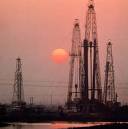Ten Years After Invasion, Iraq Continues to Import Oil Products

Former Iraqi oil minister Issam al-Jalabi says that although Iraq is an oil-rich country, it still imports petroleum products from abroad to meet its needs 10 years after the US-led invasion of the country.
Jalabi, an international energy expert, told Azzaman that annual imports of oil derivatives reached $6 billion a few years after the occupation.
He said the total spent by Iraqi governments on the import of oil derivatives and gas during the past 10 years is $30 billion.
Jalabi said that total could have paid for five or six giant refineries in Iraq. He said no new refineries have been constructed or are planned, adding that the government is still signing contracts to import oil derivatives.
He said this means that Iraq will spend another $30 million to import oil derivatives.
The former minister told Azzaman that corruption involved in the import of derivatives is the reason new refineries are not being built.
Jalabi said that former Iraqi oil minister and current Deputy Prime Minister Hussain al-Shahristani, when summoned to parliament, told legislators that Iraq has reached self-sufficiency from derivatives, but that this was not true.
Jalabi spoke about oil derivatives in the context of the UN oil-for-food program instituted in 1995 and formally ended in 2010. Jalabi told Azzaman: “Despite the failure to adhere to the instructions of the oil-for-food program, which did not allow the export of derivatives, Iraq has since February 2003 exported four types of oil derivatives, including gasoline, gas oil, white and kerosene and liquefied gas through land to Turkey, Jordan and Syria, and by sea via the Arabian Gulf.”
He said Iraq became an importer of petroleum products beginning in June 2003.
Jalabi also said that until the end of last year, Iraq’s oil output did not did not match its pre-invasion production rates.
Jalabi said Iraq’s oil output before the invasion and during the implementation of the oil-for-food program reached 2.8 million barrels per day, and exports 2.4 million barrels per day, despite the blockade, international sanctions and the 1991 war. Production this year reached about 3 million barrels per day, of which 2.5 million barrels are exported.
He said no major oil pipelines have been built, except for two small ones from Basra to al-Faw. He said no new export capabilities have been provided except for two fleets at the Basra port in the third quarter of 2012.
Jalabi said the Iraqi oil sector is in a state of confusion in its refining and distribution sectors due to its failure to provide new refinement capabilities or improve the quality of derivatives.
He said that differences between the Ministry of Oil and companies in southern Iraq have surfaced. This, and its differences with the Kurdistan region, has forced the ministry to cut derivative production.

